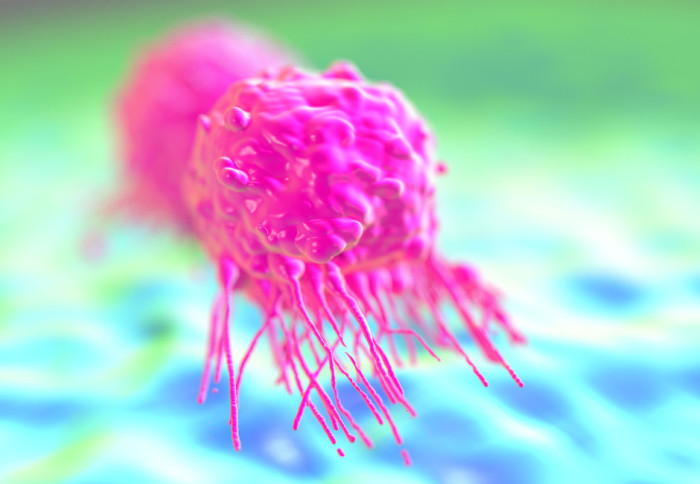New breast cancer treatment and climate voices: News from the College

Here’s a batch of fresh news and announcements from across Imperial.
From a promising new treatment for breast cancer, to insights into how Imperial research is tackling climate change and the biodiversity crisis, here is some quick-read news from across the College.
Possible new breast cancer treatment
 An international study has identified a possible new breast cancer treatment.
An international study has identified a possible new breast cancer treatment.
The five-year study, which involved researchers from seven institutions across three countries, including Imperial, suggests that a type of protein, called LMTK3 inhibitors, could be used for the treatment of breast cancer, and potentially other types of cancer.
The early-stage pre-clinical research, which involved breast cancer models in mice, identified the protein as having potential anti-cancer effects.
It is hoped the research, published in the journal Science Advances, will allow the further development LMTK3 inhibitors as a new type of orally-administered anticancer drug for patients.
The Imperial study team included Professor Naomi Chayen and Professor Justin Stebbing.
Professor Naomi Chayen produced the first crystals of the protein. She explained: “To understand the structure of a protein, we need to first have crystals of it, and then examine under X-ray. We were the first group to obtain crystals of this protein, which may have anti-cancer effects.”
Lung regeneration
 A new tool has been developed that will help us understand lung regeneration and tissue repair.
A new tool has been developed that will help us understand lung regeneration and tissue repair.
The Acid injury and Repair (AIR) model works by using hydrochloric acid to injure a small part of the tissue. However importantly the surrounding area remains uninjured, thus mimicking the speckled pattern of injury often observed in lung diseases.
The model allows tracking of cell types, including stem cells and testing of new treatments. This is important for research into many respiratory diseases, including COVID-19.
Read the publication from Kim and Mongey et al in Biomaterials: The acid injury and repair (AIR) model: A novel ex-vivo tool to understand lung repair.
Woman’s Hour Power List
 Former Grantham Institute Co-Director Professor Joanna Haigh is #7 in a list of 30 women celebrated by BBC Woman’s Hour for their significant positive contribution to the environment and the sustainability of our planet. The ‘Our Planet’ Power List aims to reflect the huge range of roles that are essential to environmental work.
Former Grantham Institute Co-Director Professor Joanna Haigh is #7 in a list of 30 women celebrated by BBC Woman’s Hour for their significant positive contribution to the environment and the sustainability of our planet. The ‘Our Planet’ Power List aims to reflect the huge range of roles that are essential to environmental work.
Professor Haigh was recognised for her work showing that that variations in the Sun’s activity could not be the driver of global warming trends, and for using her knowledge to influence people in power to act on climate change.
Also on the list is Judy Ling Wong, founder and Honorary President of the Black Environment Network, who gave last year’s Grantham Annual Lecture on engaging UK BAME communities in climate change action.
Listen to the programme on the BBC Radio 4 website.
Imperial voices on climate and environment
The United Nations Climate Summit, COP26, hosted in Glasgow in November 2021, is the first opportunity since the signing of the Paris Agreement for countries to set out more ambitious plans for tackling climate change. With the UK government as host, the Imperial academic community is mobilising its collective expertise to help drive ambition.
The Grantham Institute has put together a series of videos that introduces Imperial academics, why their research matters when it comes to tackling climate change and the biodiversity crisis, and how it is relevant internationally in the buildup to the COP26 climate negotiations.
To kick things off watch the video above for Grantham Director of Research Dr Joeri Rogelj’s explanation of how his research helps to inform international climate targets to limit global warming to 1.5°C, and what he wants to see at COP26.
For the full playlist, and more on what the Institute is doing to support the climate negotiations, see the Grantham Institute website.
–
Want to be kept up to date on news at Imperial?
Sign up for our free quick-read daily e-newsletter, Imperial Today.

Article text (excluding photos or graphics) © Imperial College London.
Photos and graphics subject to third party copyright used with permission or © Imperial College London.
Reporter
Andrew Youngson
Communications Division
Hana Amer
Business School
Kate Wighton
Communications Division
Simon Levey
Communications Division
Lottie Butler
The Grantham Institute for Climate Change
Ms Helen Johnson
Communications Division